2016 Georgetown University Press. All rights reserved. No part of this book may be reproduced or utilized in any form or by any means, electronic or mechanical, including photocopying and recording, or by any information storage and retrieval system, without permission in writing from the publisher.
Library of Congress Cataloging-in-Publication Data
Engelbrekt, Kjell, author.
High-table diplomacy : the reshaping of international security institutions / Kjell Engelbrekt. pages cm
Includes bibliographical references and index.
Summary: Today, great-power and middle-power diplomacy take place at two high tables, one using a well-known fixed address on First Avenue in Manhattan and the other at varying summit locations where heads of state and government meet. This book examines the growing importance of minilateral summit diplomacy in the management of international security problems. Kjell Engelbrekt contrasts the "GX" summitry of the G7 (and the G8 19982014) and G20 clubs with the older and more formal UN Security Council. He examines whether or not this new form of GX high-table diplomacy offers a more effective alternative to, or whether it simply complements, traditional institutions. One defining feature of GX diplomacy has been the diversification of countries with a seat at the table, as seen by contrasting the G20 with the five-member UN Security Council. A second feature of GX summits are their relative informality and flexibility, which has helped put nontraditional security threats on the agenda. Engelbrekt conducted research in primary-source documents of the G7, G8, G20, and UN Security Council to examine and contrast how these institutions have deliberated on three policy areas: conflict management, counterterrorism cooperation, and climate change mitigation.
ISBN 978-1-62616-312-6 (hardcover : alk. paper) ISBN 978-1-62616-313-3 (pbk. : alk. paper) ISBN 978-1-62616-314-0 (ebook) 1. Summit meetings. 2. Diplomacy. 3. International relations. 4. Security, International. 5. Conflict managementInternational cooperation. 6. TerrorismPreventionInternational cooperation. 7. Climate change mitigationInternational cooperation. I. Title.
JZ1305.E54 2016
355'.031dc23 2015025235
 This book is printed on acid-free paper meeting the requirements of the American National Standard for Permanence in Paper for Printed Library Materials.
This book is printed on acid-free paper meeting the requirements of the American National Standard for Permanence in Paper for Printed Library Materials.
17 16 9 8 7 6 5 4 3 2 First printing
Printed in the United States of America
Cover design by Jen Huppert. Cover image by Robert Michael/picture-alliance/dpa/AP Images.
Disaster may be the price of failure to achieve One World in terms of a moral and political ideal.
Inis L. Claude, Swords into Ploughshares
And so the way I see the struggle thats starting to emerge between the U.S., Europe on the one hand and rising states on the other is a struggle for voice, for authority. Its the global political hierarchy thats being contested, who gets to sit at the table, how many votes you get.
G. John Ikenberry, The Emerging Powers and the Future of the Global Order
Illustrations
Figures
Tables
High-Table Diplomacy
Acknowledgments
This book is dedicated to two categories of people without whom it would not have come into existence. The first category consists of individuals who spend most of their days solving or working around hard problems in the realm of international security. There are hundreds of thousands of nongovernmental organization (NGO) staff members, international civil servants, military personnel, and national diplomats whose work requires them to be exceptionally resilient and creative in order to overcome challenges that most of us would find overwhelming in terms of scale and institutional capacities available as remedy. In many cases these people become committed far beyond the limitations of their job descriptions and levels of remuneration. And yet these problem solvers rarely pause, let alone relent, in their attempts to alleviate the difficult situations that confront them.
The second category of people to which this book is dedicated is made of up problem preemptors, for lack of a better descriptor. These are not seldom individuals with some experience of work in the former category who subsequently engaged in creating prerequisites for international security problems to arise less frequently, to arise less dramatically, or to be handled more effectively. Their commitment to such causes takes the form of articulating proposals for preventive measures, improved institutional capacities, enhanced legal arrangements, or fresh funds addressing issues that so far have been ignored or underestimated. This second category of people operate not only in academic environments and think tanks but also within large NGOs and international organizations, combining desk or field jobs with innovative thinking about generic issues and institutional processes.
I have through the course of researching this book sat down to entertain conversations with scores of individuals from either category, characteristically ready to generously share their experiences and views with anybody who has taken an interest in security problems that cross borders. Some of my students at the Swedish Defense University in Stockholm, in fact, are problem solvers who spend a year or two reflecting on problem preemption owing to their own experience of what works in the type of situation in which they frequently operate. At the Chicago Council on Global Affairs, where I found an ideal environment to finish this project, I had the privilege of meeting some of Americas most capable problem preemptors, who have extraordinary insights into problem solving at the international, national, and municipal levels, working on projects or appearing on the roster of visiting speakers.
Aside from this general dedication to internationally minded public servants, my deepest gratitude for hosting me and my busy laptop goes to all colleagues, partners, and friends in those two great American cities where my research began and ended. It was during a sabbatical semester to New York and Columbia University, facilitated by Timothy Frye at the helm of the Harriman Institute, that the early stage of the project took form. Robert Jervis invited me to his seminar on security and diplomacy, and Michael C. Doyle commented generously on my nascent project. Had my 2010 stay in Manhattan not been generously sponsored by the Wenner-Gren Foundation, I may not have been able to conduct so many interviews at the United Nations Headquarters, as many were agreed to on short notice owing to the relative inflexibility of the schedules of many senior diplomats.
In the final stage of my work, Americas Second City offered me a stimulating intellectual environment in which to complete the manuscript, ranging from the Chicago Council on Global Affairs as the citys preeminent think tank to the Program on International Security Policy (PISP) seminar at the University of Chicago and the staff seminars at the Department of Political Science and the Office of International Affairs at the University of Illinois at Chicago (UIC). My special thanks go to Rachel Bronson, Dina Smelz, and Ivo Daalder at the Chicago Council and Dennis Judd, Evan McKenzie, Seung-Whan Choi, Petia Kostadinova, and Diplomat in Residence Ian Kelly at the UIC for hosting me and making me feel welcome. As a visiting fellow to the Chicago Council and the UIC, I could benefit from the combined insights of visiting policymakers and fellow scholars with regard to my research topic, and the citys outstanding flight connections made it an ideal launching pad for a final set of interview trips to New York and Washington, DC.

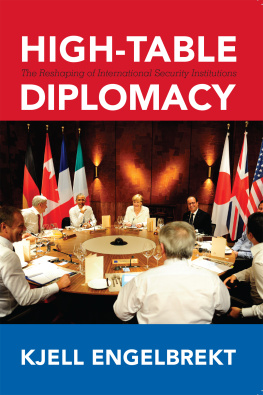
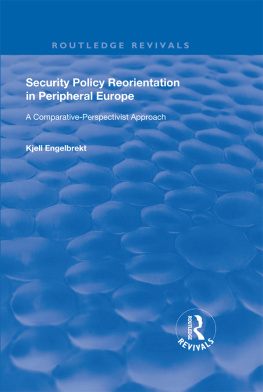

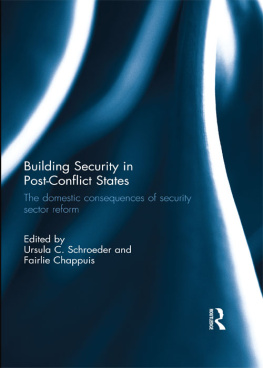
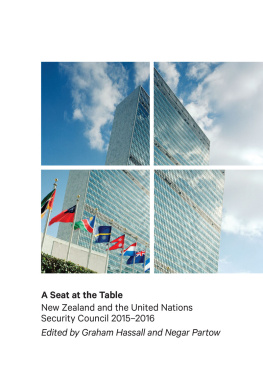
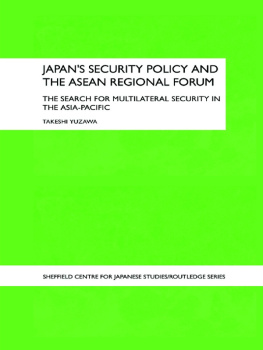
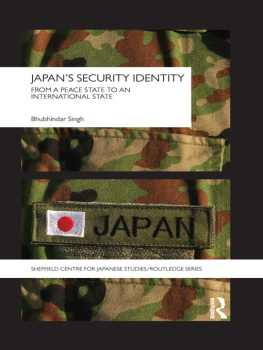
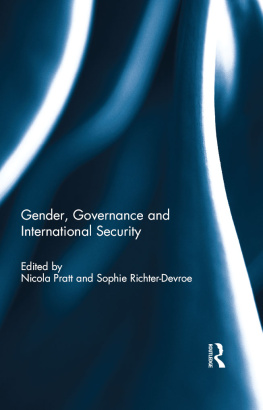
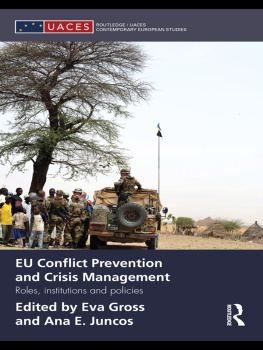
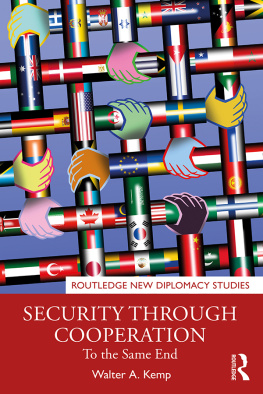
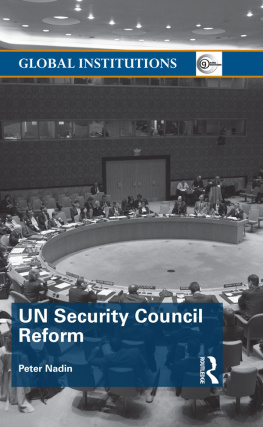

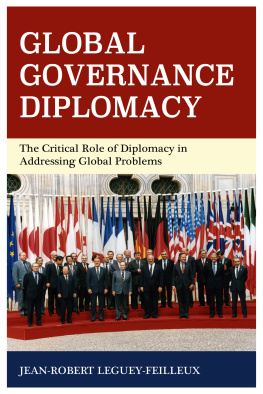
 This book is printed on acid-free paper meeting the requirements of the American National Standard for Permanence in Paper for Printed Library Materials.
This book is printed on acid-free paper meeting the requirements of the American National Standard for Permanence in Paper for Printed Library Materials.